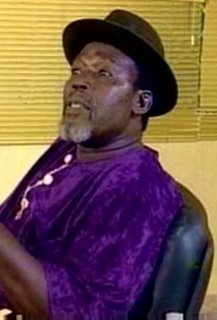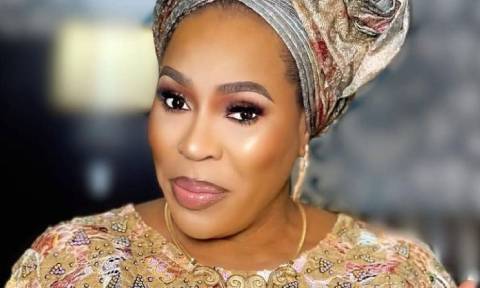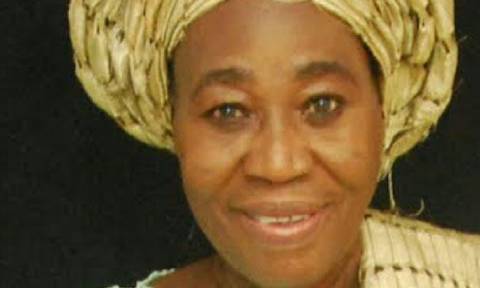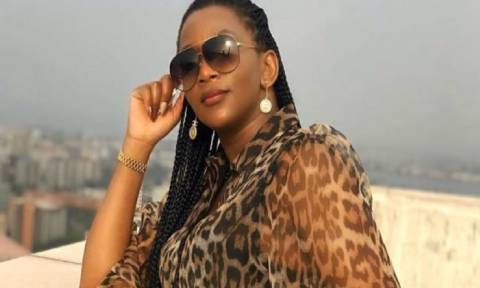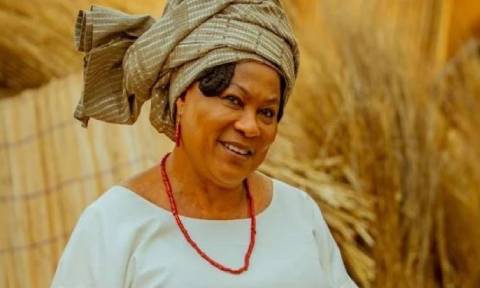
Q: You have had an impressive acting career. Could you tell us how it all began?
A: I cannot remember how it all started, but I know that I was in elementary school and I was a member of the choir and I was always taking solos. Where the girls had their high pitch when it came to singing, I also had a high pitch. And this made me a very good competitor and they chose me ahead of them. I was also in school plays and very conveniently, I took roles. So I was always involved. But I remember one day I was sent on an errand and I saw this vehicle from which music was blaring. It also had posters of people, who were the actors of a drama that was being advertised. I took one of the posters to my mother. I told her that these people were having a play and I would want to see the play.
So, my mother used the opportunity to ask me to do the things that I usually didn’t like doing: chores like keeping my room tidy, making sure that my books were in good order and doing my home work. Of course, there was no problem. I could have done anything to see that drama. So I did everything she asked me to do. I went back to inform her that I had done everything. She looked at me and told me that the approval was not completely hers. She had to talk to my dad. I then started praying that my dad would be in a good mood. When my dad came, she did not tell him in good time, so I became agitated but she said I should calm down. Eventually, my mother spoke to my dad and he agreed. In fact, I was ecstatic, but didn’t know what to expect in the hall.
All I wanted was to see these actors. The venue was known then as Colonial Hotel in Kano. I was born in Kano. This hotel, which is on Hospital Road, is now called Paradise Hotel. We got to the venue in good time and I sat in front of my father, so I could see everything. And the play started. I really enjoyed the music, the dances. Our theatre is a total theatre, with dancing, singing and acting. It was wonderful and I was more interested in the reaction of the crowd. When the play was going on, I was watching the crowd and I saw people laughing, not smiling. They laughed from their inside and I said I would want to do this kind of job. Probably that was the first time I consciously said it out and when I told my dad, he did not take me very seriously. But I must confess that for weeks, I could not get the experience out of my mind. It was there all the time.
But I still remember my father’s reaction when I told him again that I would want to be an actor. He said yes, ‘you can be an actor but this time, we are talking about what would be your profession, not hobby’. But I insisted I wanted to be like those people because they were professionals in their own right. That is what they do and they get paid, I explained to my dad. But he said that was not for me. I must go and study for some other profession and that when I finished, I could still act. After all, he was a master drummer and prolific dancer. And he did it as a hobby so he did not quite understand why what he did as a hobby, I was planning to do as a profession. He did not quite understand my logic, but I kept quiet and continued with my education.
When I finished, I went to secondary school. By the time I was old enough, there was a riot in Kano, the crisis of the 1950s. After that riot, my parents, for the first time, felt uncomfortable in Kano that had been home to everybody. Suddenly, it turned out that Kano was no longer the safe haven we knew. So, we children were moved to the South to continue our education. They had reasoned that if we were away and anything happened, they could run, if they had to, without having to worry about us as well. That was how we moved to the South and only came on holidays to Kano. When I eventually finished my secondary school and I wanted to travel to England, my dad did not want me to go at all. He was upset. He held on to the form I gave to him to fill. But I was so determined at that time. I went and got another form, filled it and somebody else signed for me. And I left for England.
Q: Looking back, how would you describe your experience as an actor, from your early days in the Untied Kingdom to now?
A: When I was in England, I was different. How did I get my first job? When I finished and I wanted to work, I discovered that I could not get an agent because I was not a member of the Actors Union. And I couldn’t become a member of the union because I did not have a job. And I could not get a job because I didn’t have an agent. And no agent would take me if I was not a member of the union. So, I thought that was the end of the whole thing. I was still feeling sorry for myself when a friend called me and just mentioned that he was going for audition the following day. And I asked him if I could come. He said yes and gave me the address and time.
I proceeded to the audition with my friend’s agent’s number. I went there very early, in case there was anything I could do. Then around 8 a.m, a young man came out from a car to me with a pen and paper. He said I should write my name, my telephone number and my agent’s name. I wrote my name and the name of my friend’s agent and telephone number. That was how I became number one on the list of that audition because he had assumed that I came from an agent. And when the director came, I was the first to be called. We talked and the director was nice. He asked me if I had given my agent’s name to the producer because they had to get in touch with her. I said yes. And they thanked me. The moment I left there, I called the lady. I said: ‘Good morning, madam. You don’t know me but you are my agent. I have just got a job. Please you must assist me. My name is Olu Jacobs.’ She told me to calm down. I told her that I had just attended an audition and that they were going to call her. She then asked me to bring my portfolio so that we could talk. I said I was on my way. Less than half an hour later, I was with her. She was actually waiting for me at her door. She just wanted to see this guy. She was a wonderful lady. And that was how I got my first job. Now, over the period I was getting very sad. I was sad because there was nothing they have in England that we do not have in Nigeria. We have the weather, the ability, just name it. I began to get really downcast. Don’t forget that I left Nigeria is 1964, but came back in 1980 for the first time just to see what was happening.
By then, I had decided that I must leave because I had got to a certain stage in my career where I no longer attended auditions. I only attended interviews and I got the scripts well in advance and I read it and gave my insights on the scripts. The director would want to see me and I too would want to find out if the director was the kind of person I would want to work with. These are directors who don’t allow you to move. They just cramp you with their own ideas alone. It has to be give and take so that one can move with it. That was the state I found myself. And there was nothing else to do. I asked myself if that was all I wanted to do with my life. I wanted to come back home so that we can develop our own theatre too. I knew about the National Theatre, but I found out that it wasn’t doing as much as I thought it would do. So I came in 1980, 1981, 1982 and 1983. Each time I came, I did a play at the National Theatre and I was doing television as well. But by 1984, I was invited to come and help start a series called Second Chance. It was a take-off on Mind Your Language, a British series in which people from different countries met and understood one another by laughing at one another’s idiosyncrasies. We did not have to look for people outside. We have 958 tribes in Nigeria, so we had more than enough. We had Okonkwo, the Calabar man, the Benue man, Sokoto, Yoruba and others. We had a good mix and I was the director of studies. That was in 1984. I was supposed to be there for three months, but ended up staying from July to November. Then in 1985,
I went to do a movie called Ashanti. I was invited by Roman Polanski, and a Polish producer resident in America. As a matter of fact, he was resident in Paris at the time. My agent in the UK called me to say that Roman wanted to see me. The producer had been calling my agent since August, but I did not call Roman until November. When I called, my agent said they hadn’t started the movie and were still waiting for me. Then, Peter Igho was the supervising producer for Second Chance and I told him I must go; that Roman was waiting for me. So, I left and met Roman a few days after. When he saw me, he was excited and asked me if I did not want to work with him. I said I wanted to work. I apologised to him and told him that my country invited me to come and help start a series and we had just started the series. He just sat down and said nothing. Suddenly, his tone changed.
He asked if I had read the script and I said yes. He asked if I liked it. I said I did. He called somebody to bring Vodka, which was my favourite drink at that time. He then called the producer to join us. The producer complained that I kept them waiting, but Roman told him that I was on a national assignment. They really respected the fact that my nation had asked to use my service. They were so proud and happy that they waited. We worked on that movie, with locations in Italy, Malta and the Indian Ocean. It was really exciting.
Q: Acting has really taken you to many exciting places. And you have also had great moments. What kept you focused despite all these distractions?
A: Two things. One is God. We thank God that one has been able to maintain, to a reasonable extent, one’s senses. We all joke and play, but the ability to pull oneself back and ask where you are going makes a huge difference. You have to talk to yourself. If you can’t talk to yourself, who would? I also thank God for keeping the ears open so that one can hear oneself. You have to enjoy your good times because they make you appreciate the bad times. What I had was a difficult beginning, breaking into the system in England. That was quite difficult. But I was lucky that I had an agent who liked me, understood me and also shared my vision.
Q: What exactly are you working on at the moment?
A: An organisation in Canada has invited me to that country. The leader of the organisation, a certain Mr. Azikiwe, a nephew to Nigeria’s first President, wants me in Canada. However, I have many scripts that have to wait until I return from Canada where I will be receiving awards from these kind Nigerians and their associates. I feel humbled when people take the trouble to say ‘thank you’. I am always happy because it means that I have affected some lives. I am also happy that among our children, their best ten actors will comprise of seven Nigerians and three foreigners. That is where we are now. Even in music, the story is the same. That is my pride, that is what I want. When our children go out now to rent movies, they will rent Nigerian movies. This was not so before. Let those who want to criticise go ahead and do so. It is good for us as long as they commend us for the good things we do.
Q: One of your ambitions is to build a functional studio where you can expand this production process. How many steps are you away from realising that ambition?
A: I am no too far, but far enough because a key area like finance is still keeping us back. To raise the money is not easy because whoever gives the money wants to find out how you are going to recoup, which brings me to the second problem. How do you get these products to every nook and cranny of Nigeria? So that when you say the movie is coming out on Tuesday, it comes out on that day in Lagos, Enugu, Aba, Calabar, Ibadan, Kano and Kaduna. That is what you need. You need distribution and for you to carry on your distribution effectively, you need money to make at least a million copies. And you must also promote the products. You are aware of the problems of piracy. Nobody cares because we pay lip service to the problem of piracy. This is why we say we like the new arrangement by the Censors Board. It shows possibilities and we should give it an honest effort.
Q: Traders have a very huge influence in the Nigerian movie industry and this has adversely affected creativity and content. What could be done to reverse this ugly trend?
A: We have to build trust. That is the problem. There is no trust at all. As I know, there is this association of marketers that held a meeting and told their members not to get involved with the Censors Board. But they went behind and registered with another name. So they were covering themselves on both sides and when Censors Board announced the withdrawal of their licences, they were there laughing while their disciples that were told not to register were left in the cold.
Q: What is your response to those who are still of the opinion that the Nigerian movie industry is sheer mediocrity?
A: They should go and create their own. I always believe that if I disagree with anything, I have to join them to fight from within, then you can evolve change. If you stay outside and you are shouting, I will ask you to continue shouting and I will respond to you. If you want to talk to me, you come and talk to me. Let us work together, let us join hands. Let us do it. Other nations see our products and they commend us. People who criticise everything can never do well themselves because they can never see anything good.
Q: Do you want to be remembered for anything?
A: I want to be remembered as somebody who cared for the younger generation. Somebody who tried to give these young people as much advice and as much help as I can. And when I see these young people doing well, I tell them. When I see them doing badly, I also tell them. I watch them and look out for them. I always try to give them confidence and encouragement.
